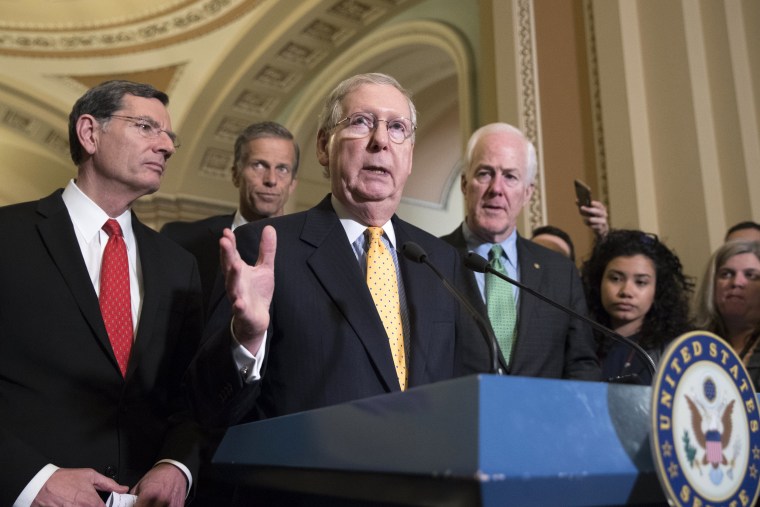WASHINGTON — Senate Republican leaders are still searching for consensus on a health care bill that doesn’t yet exist while the legislative window to act begins to close and pressure from the White House to pass a measure continues to grow.
On their first full day back in Washington after more than a week-long recess, Senate leaders presented their 52-member conference with a broad outline of what a health care bill could look like for the first time.
Then they joined House leaders for a visit to the White House to meet with President Donald Trump to discuss the effort to repeal and replace the Affordable Care Act, also known as Obamacare. There, the president praised House leaders for passing their version of the bill and insisted that the Senate will do the same.
“The Senate I'm sure will follow suit and get a bill across the finish line this summer that will be great health care for Americans. And I'm looking forward to seeing it — so looking forward to seeing it,” Trump said flanked by the GOP leaders at a conference table.
Back on Capitol Hill, Senate Majority Leader Mitch McConnell downplayed the importance of the all-conference health-care session, saying that it is “just one of an ongoing series of meetings” on the issue.
The GOP leader sounded optimistic, saying, “We’re getting close on a proposal to whip and take to the floor,” he said. But getting the support of at least 50 of the 52 Republicans in the senate remains a difficult prospect.
Tuesday was the first time that the full GOP conference was presented with ideas for a the health care bill, including a PowerPoint presentation, fashioned by key staff members during the recess. Normally talkative Republicans emerged from the more than hour-long meeting without much to say, refusing to offer many details or indicate what they thought of the ideas they had heard.
Senator Rob Portman, R-Ohio, who is interested in protecting the Medicaid expansion that has taken place under Obamacare, refused to endorse the plan, simply saying, “It’s getting there.”
Sen. Dean Heller, R-Nev., who is the only Republican up for re-election in 2018 in a state that Trump lost, also said that he’s not yet willing to support the plan.
“I’m looking for the small print at this point,” Heller told reporters.
Sen. Rand Paul, R-Ky., wouldn’t answer questions but it seems unlikely that he would support the direction of the Senate GOP bill, which is nothing like the complete repeal that Paul was proposing earlier this year. Paul’s spokesman Sergio Gor said Paul “remains optimistic the bill can be improved in the days ahead and is keeping an open mind.”
Sen. Orrin Hatch, R-Utah, one of the co-authors of the forthcoming bill, was a bit more candid about the mood of Republicans. He said the meeting was a “good” one but called it “intense.”
“All of these discussions are intense,” Hatch said.
Republican leaders are pushing for a vote on a Senate health care bill by the end of June, an optimistic timeline that would allow the Senate to dispense with the issue one way or another.
As the backlog of Republican priorities piles up — tax reform, infrastructure, debt ceiling and government funding bills — Republicans are anxious about moving on. Aides say that it is unlikely that work on health care would go beyond July.
When asked if McConnell would bring up a bill for a vote even if he doesn’t have the votes, he said, “We’ll let you know when we’re going to go to the floor with it.”
While the details of any Senate proposal are still vague, one priority is emerging as more health insurers exit the Obamacare individual marketplace: stabilizing the market. Anthem announced it is leaving most of Ohio’s individual market in large part because the Trump administration has threatened to end cost-sharing subsidies.
“There is a concerted effort and will be a concerted effort to stabilize the market,” said Sen. Bill Cassidy, R-La. “That’s the first thing we have to do with those with pre-existing (conditions) and that’s a big thing - a first thing and a big thing.”
Cassidy said leaders are proposing a pool of money around $15 billion per year for the first couple years to ensure people purchasing insurance outside of an employer system can access insurance.
While Republican leaders are working on the policy and politics of crafting a passable bill, the mechanics of the bill have been approved. The Senate parliamentarian ruled that the House bill can advance under the strict rules of reconciliation, a legislative vehicle that enable Republicans to pass health care with 51 votes instead of 60 but also mandates that the legislation must save money.

